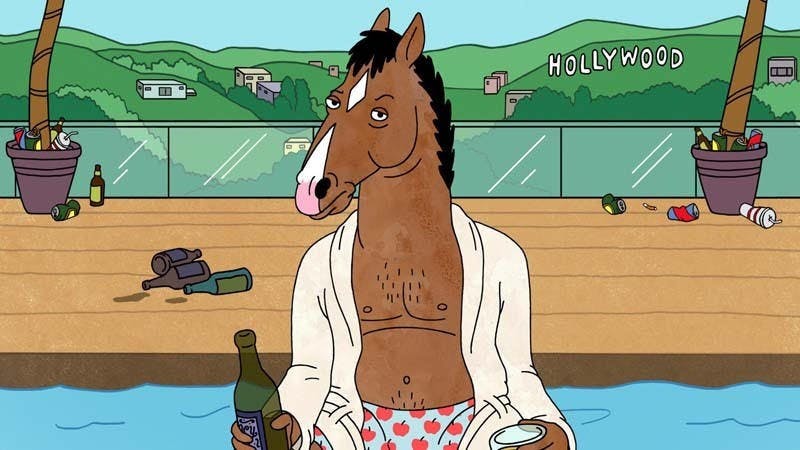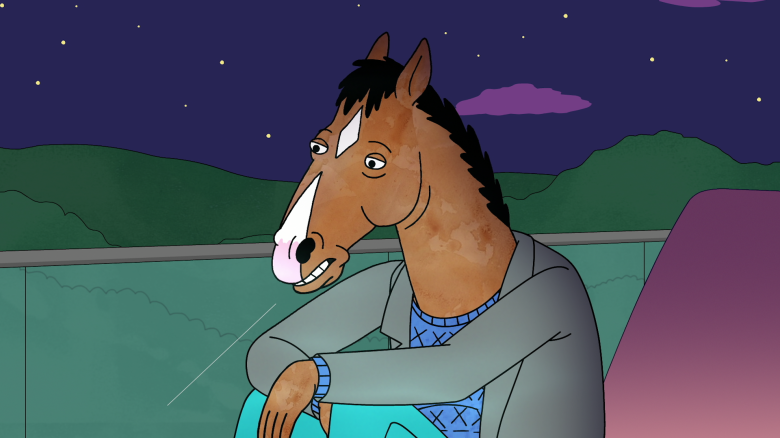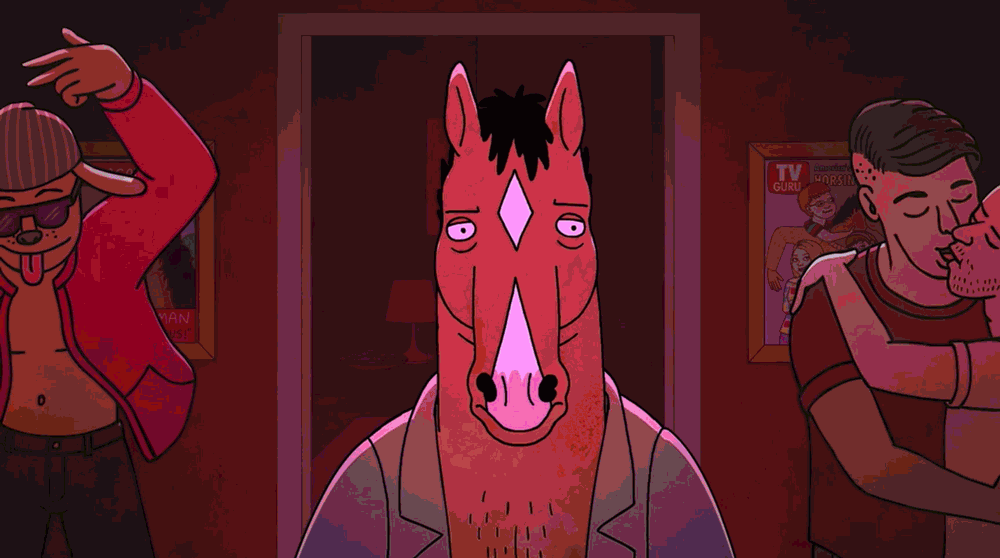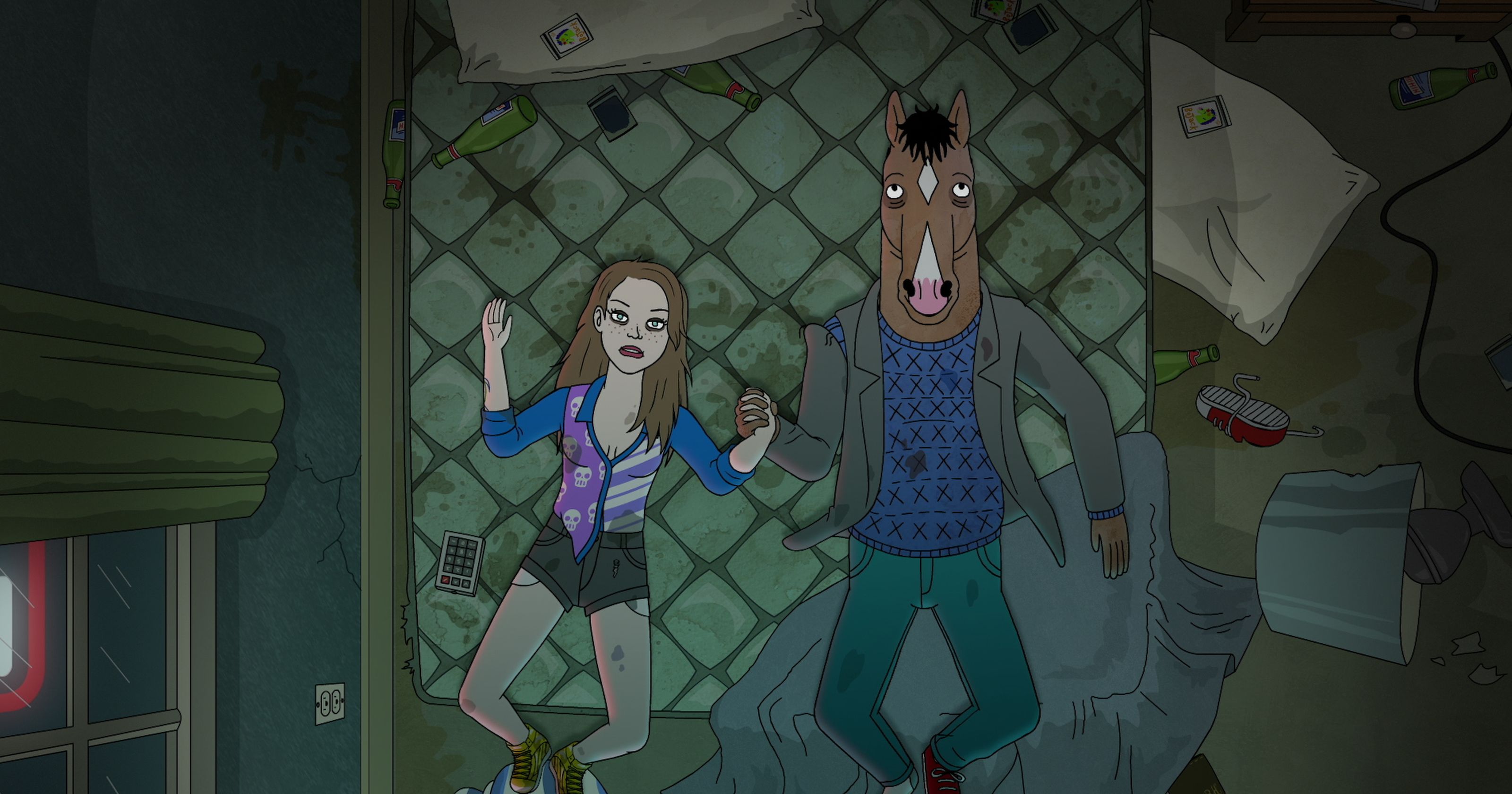This is another video from my YouTube channel, Jack’s World. This video is about unlikable characters and why we root for them. There have been no shortage of such characters over the years. But few have really resonated as much as Bojack Horseman. There are so many things unlikable about this character and over the course of his show, he does many objectively awful things. And yet, he’s still someone I found myself rooting for. Why is that? Why do we feel this way about certain characters? I don’t claim to know the answer, but I make an effort in this video. Enjoy!
Tag Archives: Mr. Peanutbutter
Why Do We Root For Characters Like Bojack Horseman?
Filed under Bojack Horseman, television, writing, YouTube
Hard Lessons In Redemption: Bojack Horseman Vs. Prince Zuko
The following is a video from my YouTube channel, Jack’s World. This video is an exploration in how characters succeed or fail to redeem themselves. There are many characters in various mediums who walk the path of redemption, but not all complete it.
Bojack Horseman is one character who tried to walk it, but failed.
Prince Zuko is another who walked that path, but he managed to succeed.
How they each went about their respective journeys is unique and it offers some powerful lessons worth highlighting. Enjoy!
Filed under Bojack Horseman, Jack's World, television, writing, YouTube
Lessons From Bojack Horseman: The Toxic Effect Of Celebrity
The following is a video from my YouTube channel, Jack’s World. This video is my first deep dive into Bojack Horseman, one of my favorite shows of all time. This Netflix series was so groundbreaking in how it told the story of a washed-up sitcom star from the 90s, who just happened to be a talking horseman. It was funny, but dark at times.
Okay, it was dark most of the time. But that’s beside the point.
There this show offered so many profound themes and insights on everything from mental illness to toxic cycles. But in this video, I focus on how this show depicted the world of celebrity and celebrity culture. Because Bojack’s story can’t be told without also telling the story of a celebrity with a great many personal issue. And while his story is powerful, I also think it sheds a light on the dark side of being a celebrity and how it affects people.
Filed under Bojack Horseman, Jack's World, Uncategorized, YouTube
Why Do We Root For Characters Like Bojack Horseman?

Why do we root for people who do awful things?
Why do we root for the crazed killer in a slasher movie?
Why do we celebrate anti-heroes over traditional, upstanding heroes?
Why do we want people who do irredeemable things to be redeemed?
These are questions are similar in that they have a common theme, but they apply to a wide variety of situations. It feels like those questions have become more relevant in recent years as the standards for quality TV, movies, and characters has risen, which I’ve called the Walter White effect. While it can make for compelling stories, the questions themselves have distressing implications.
I’ve found myself contemplating those questions more seriously after the final season of “Bojack Horseman.” While I love this show and have praised its themes in the past, the final season really pushed the envelope on how far a show could go in telling stories about broken characters.
There’s no getting around it. From the first episode to the series finale, it’s abundantly clear that Bojack Horseman is not a respectable person. He’s a self-centered, narcissistic, alcohol, ego-centric asshole who has hurt people, exploited people, and taken full advantage of his celebrity status. If we knew someone like this in real life, we would never root for them. We’d probably root against them.
However, as I watched this show over the years, I still found myself rooting for Bojack. In following his story, learning about who he is, where he comes from, and how he deals with his problems, I genuinely hoped that he would find some semblance of peace in the end. Even as his sordid deeds started to come to light in the final season, a part of me didn’t want to see him fall, especially when he’d made so many strides.
Bojack isn’t the only character with this issue. There are countless other characters in popular culture, such as Don Draper and Wolverine, who do many awful things throughout their story. I’m a fan of those characters, especially Wolverine. At the same time, I can’t ignore the fact that he’s done terrible things that are on par with Bojack’s crimes.
At the same time, I root for Wolverine. I also find it easier to root for him over Bojack because while Wolverine is largely a product of what others have done to him, Bojack is a product of his own awful decisions.
Bojack has no special powers or excuses, outside being a celebrity. He has his share of issues and circumstances, from verbally abusive parents to substance abuse to legitimate mental illness. However, throughout the show, he’s still the one who makes the choices that ultimately hurt him and his loved ones. Moreover, he spends a great deal of time avoiding the consequences or downplaying them.
This is why I think the final season of “Bojack Horseman” was so impactful. While I did often root for Bojack throughout the show, the final season made it a point to remind everyone of the terrible things he’s done. The show is brilliant in how it has everything collapse around Bojack, but not because of circumstance. Once again, his own terrible choices and endless excuses are what do him in.
Seeing him face real, actual consequences for his decisions helped give the show a sense of balance when it ended. Bojack didn’t have a happy ending. Very few characters did. At the same time, he wasn’t killed or endlessly punished. It just left him in an uncertain state where he faced consequences for his past choices. Now, he has to make new choices moving forward.
It’s not satisfying for anyone who’d been rooting for Bojack. At the same time, it’s cathartic for that part of us who wanted him to face consequences for the awful things he’d done. Even so, the fact we rooted for him in the first place is oddly jarring and I think it speaks to a part of our nature that’s difficult to understand.
On some level, I feel like people want to see horrible people redeem themselves. Redemption stories are powerful in both the world of fiction and the real world. I think it’s in our nature to want to see good in everyone, even when they’ve done awful things. The power and desire to forgive is real.
However, does that mean we should let horrible deeds go unpunished? It’s one thing to forgive someone for a lie, but what about someone who abandons his best friend when he gets fired? What about someone who nearly chokes a woman to death in a drug-fueled rage? What about someone who takes advantage of a woman with amnesia?
Those deeds are all things that Bojack did over the course of “Bojack Horseman.” There are many others, some of which he never faced consequences for. Even though he’s an extreme example, even by fictional character standards, we still root for him. We still want him to find redemption. I think that says more about us than it does about him.
Awful people will do awful things, but when we see them trying to make things better, it’s hard not to cheer them on. I believe its in our nature to want to see others be the best they can be. The challenge is balancing that inclination to root for them and the need to punish shitty behavior.
Bojack’s story is over, but there are plenty of other characters like him that we root for. It’s not wrong to root for them, but it’s important to maintain a proper perspective. Redemption can be a powerful story. However, can there be any redemption without consequences?
I don’t know the answer. If you have some insights, please share them in the comments.
Filed under Bojack Horseman, human nature, media issues, psychology, television
The Flaw In Happy Endings According To “Bojack Horseman”

The world can be a harsh, unforgiving place. The extent of that harshness often depends on circumstances, attitude, and even blind luck. Most people, no matter how rich or successful they are, learn that lesson at some point in their lives. It’s rarely pleasant and often leaves scars that don’t heal.
Even with those scars, many cling to a hopeful, wide-eyed idealism about how much better the world could be. Moreover, that world is worth pursuing at every turn. TV shows, movies, music, and literature convinces us that it can be done and still have plenty of room for commercials, ads, and movie trailers. Nearly every great narrative tries to sell us on some unique kind of world-healing happy ending.
Then, there’s the strange and exceedingly depressing world of “Bojack Horseman.” If ever there was a show that went out of its way to kill happy endings with the force of a billion gut punches, it’s this one. Think of all our most cherished ideals from popular media, social movements, and ideology, in general. “Bojack Horseman” finds a way to crush it all while still being funny, albeit in its own dark way.
/cdn.vox-cdn.com/uploads/chorus_image/image/61408593/BoJackS5_EP6.0.png)
I promise it’s funnier than you think.
I say that as someone who has watched “Bojack Horseman” since the first season, but I find myself appreciating its dark themes more and more lately. However, it’s not just because the harshness of the real world is a lot harder to hide in the era of the internet and social media.
Recently, I had a chance to re-watch the past couple seasons. In doing so, I noticed just how much our collective worldview is built around our hope for a happy ending. Almost every character on the show, from Bojack Horseman to Diane Nguyen to Princess Caroline to Mr. Peanutbutter, is driven to achieve some idealized ending for themselves.
For Diane, she seeks to become a successful writer who exacts meaningful change through her work.
For Princess Caroline, she seeks to be an accomplished, independent woman who has it all, both in terms of career and family.
For Mr. Peanutbutter, he seeks to make everyone around him happy and pursue every new project with wide-eyed passion.
For the titular character, Bojack Horseman, pursuing that ending is more complicated. Through him, the harshness of reality seems to hit everyone and everything he comes across. It’s not always through his actions, which are often selfish, reckless, and downright deplorable. His story, which helps drive the show from the beginning, reveals how pursuing idealism can leave us vulnerable at best and destroyed at worst.

To understand how the show does this, it’s necessary to understand what makes this show both unique and appealing. If you only watch the first few episodes, then “Bojack Horseman” doesn’t come off as all that deep. It just seems like a story about a narcissistic washed-up actor who happens to be an anthropomorphic horse in a world full of various human/animal hybrids.
After a while, though, you start to appreciate how Bojack reflects the ugly reality of self-centered celebrities. Whether they’re at the height of their popularity or have been out of work for years, they live in a world that basically requires them to be utterly self-absorbed and completely detached from reality. Living in that world tends to obscure what reality is and provides one too many mechanisms for escaping it.
In the show that made him famous, “Horsin’ Around,” everything was skewed. Every problem was solved within a half-hour. Everyone was happy by the end of the episode. Bojack seems at his happiest and most fulfilled when the cameras are rolling and the show is on. Behind the scenes, which is where most of the show takes place, the ugliness of his reality takes hold.

Without the show, that ugliness consumes him. Over time, it wears on him, causing him to seek that idealized ending that his show often espoused. Throughout multiple seasons, it leads him down many paths. At the same time, others like Diane, Princess Carolyn, and Todd Chavez attempt paths of their own.
From this foundation, any number of ideals can take hold. In Hollywood, or “Hollywoo” as it comes to be called in the show for hilarious reasons, an entire industry is built around telling stories or crafting media that either champion those ideals or distract people from reality. For someone like Bojack, who gets crushed by reality harder than most, it’s the worst place for him to be.

Bojack, and his colorful cast of supporting characters, either embrace or get sucked into this fanciful world. Throughout the show, they get put into positions where they can pursue their dreams, achieve what they think will make them happy, and even are allowed to succeed in some instance. If this were any other show, then that would be the happy ending that both the characters and the audience expect.
“Bojack Horseman” is different in that it goes out of its way to expose the flaws in those idealized endings. The creator of the show, Raphael Bob-Waksberg, has even gone on record as saying that he doesn’t believe in “endings,” at least in the way that TV, movies, and popular media present it. In a 2015 interview, he said this about endings.
Well, I don’t believe in endings. I think you can fall in love and get married and you can have a wonderful wedding, but then you still have to wake up the next morning and you’re still you. Like, you can have the worst day of your life, but then the next day won’t be the worst day of your life. And I think it works in a positive and a negative, that all these things that happen are moments in time. And that because of the narrative we’ve experienced, we’ve kind of internalized this idea that we’re working toward some great ending, and that if we put all our ducks in a row we’ll be rewarded, and everything will finally make sense. But the answer is that everything doesn’t make sense, at least as far as I’ve found. Maybe you’ll interview someone else today who’s like “I’ve figured it out, here’s the answer!” But I don’t know the answer, and so I think it would be disingenuous to tell our audience “Here’s the answer!” It’s a struggle, and we’re all trying to figure it out, and these characters are trying to figure it out for themselves.
This sentiment plays out time and again over the course of the show. On more than one occasion, Bojack seems like he’s on the verge of achieving that happy ending and turning those ideals into reality.
He thinks getting cast in his dream role as Secretariat will give him that ending, but it doesn’t.
He thinks being nominated for an Oscar will give him that ending, but it doesn’t.
He thinks being cast in a new TV show will give him that ending, but that only makes things much worse.
At every turn, reality catches up to him. Whether it’s his many vices, his habitual selfishness, or his terrible choices, it always comes back to haunt him. Even when that happy ending seems achievable, it always becomes mired in complications that Bojack can’t always control. The same complications often impact other characters seeking their own happy endings, as well. For some, it ends up being downright tragic.

At times, the show paints a grim picture about even attempting to pursue a happy ending. Even when Bojack has insights into the process, it’s never as easy as his old TV show makes it out to be. However, the fact he and others around him keep pursuing that ending says a lot about everyone’s need to achieve something greater.
Even in a world without talking horsemen, that’s something a lot of people can relate to. Most of us build our lives around hopes and aspirations that we’ll forge our own happy ending. There may even be moments when we feel like we achieve it, whether it’s graduating high school, getting married, having children, or finally beating level 147 in Candy Crush.
However, even after those moments, the credits don’t roll. Things don’t end. The things that led you to that moment only work to the extent that they led you to that one singular moment. Life still continues and the happiness fades. Bojack experiences this at greater extremes, some of which are downright absurd, but people in the real world experience it too throughout their lives.

I can personally attest to this. When I finally finished high school, I thought that was like slaying the final boss in an impossibly hard video game. I felt the same way after graduating college, getting my first girlfriend, or publishing my first book. If the credits started rolling at that moment, it would’ve made for a great ending.
Unfortunately, life just doesn’t work like that. “Bojack Horseman” belabors that every chance it gets while still managing to inject some meaningful comedy along the way. It’s a lesson worth learning, especially for Bojack. It’s one he’ll probably keep learning in future seasons. Chances are, we’ll all learn with him along the way.
In many respects, the one who best summed up this sentiment isn’t Bojack himself. In Season 3, it’s Diane who lays out the harsh reality that everyone in the real and fictional world struggles to accept.
“It’s not about being happy, that is the thing. I’m just trying to get through each day. I can’t keep asking myself ‘Am I happy?’ It just makes me more miserable. I don’t know If I believe in it, real lasting happiness. All those perky, well-adjusted people you see in movies and TV shows? I don’t think they exist.”
It sounds depressing, but that’s par for the course with “Bojack Horseman.” Reality is often depressing, but it’s not utterly untenable because happy endings are impossible. There are many points in the show that try to make that case. Even Bojack himself tries to make that case, albeit in his own twisted way.
I would even argue that the show’s brutal attack on the very concept of idealized happy endings is uplifting, in and of itself. By making the case that all the happy endings we see in the idealized versions of fiction are flawed, it shows how futile and counterproductive it is to pursue them. The real world is harsh and brutal, but you can find moments of happiness along the way. They’re not endings. They’re just part of life.


